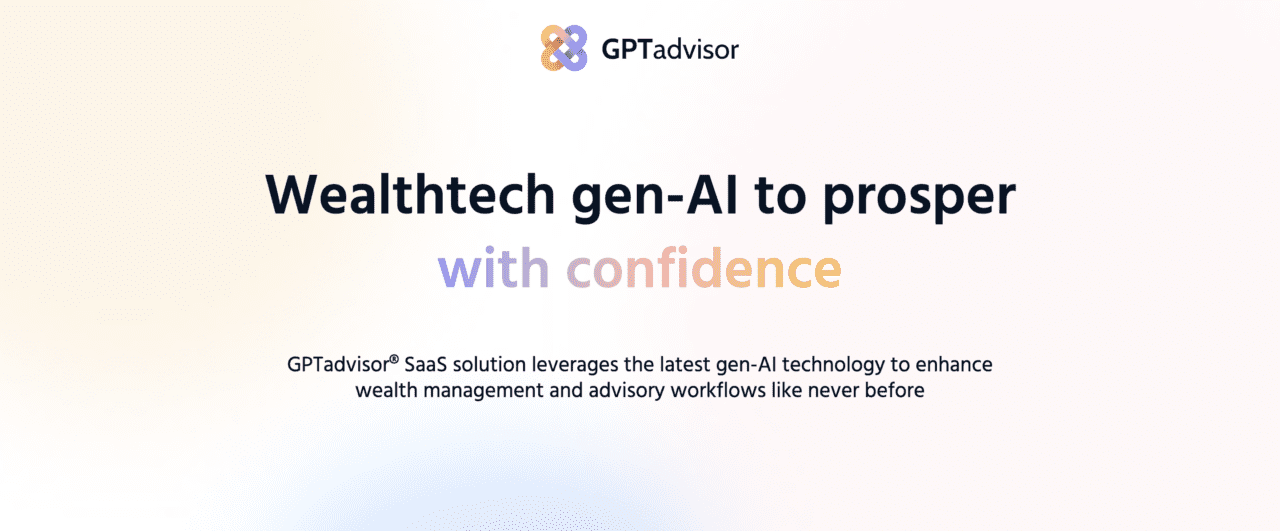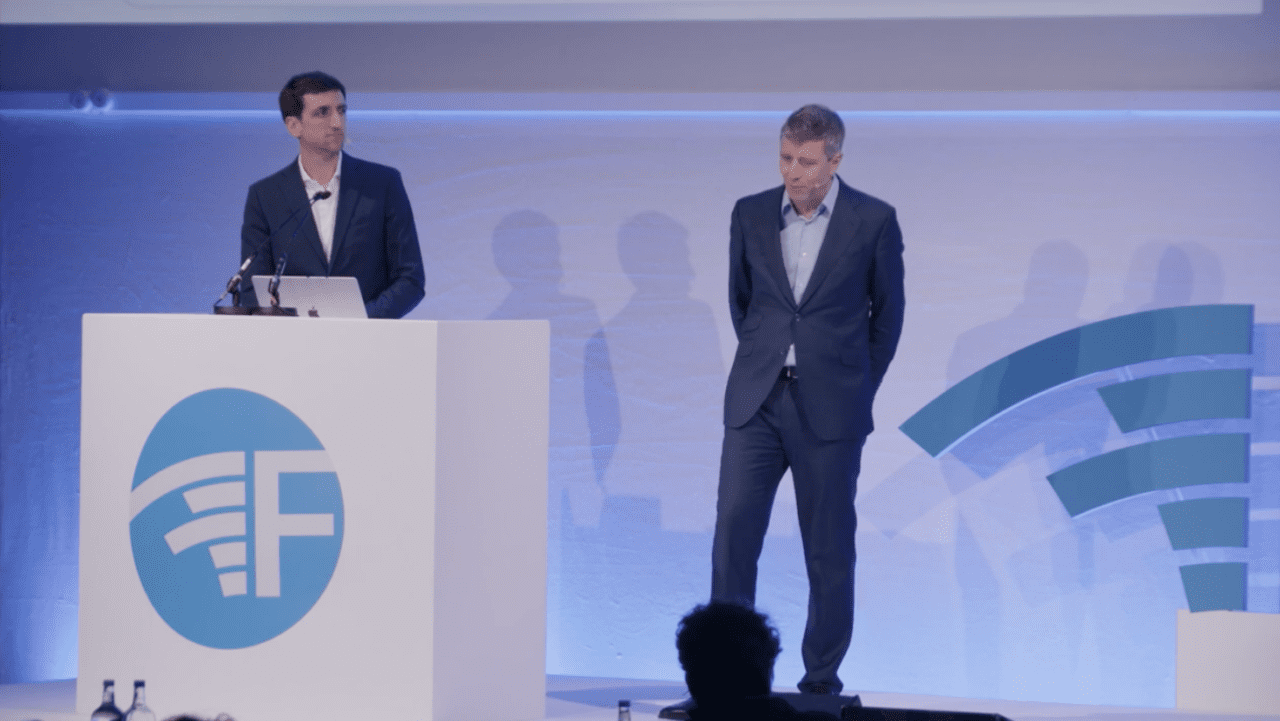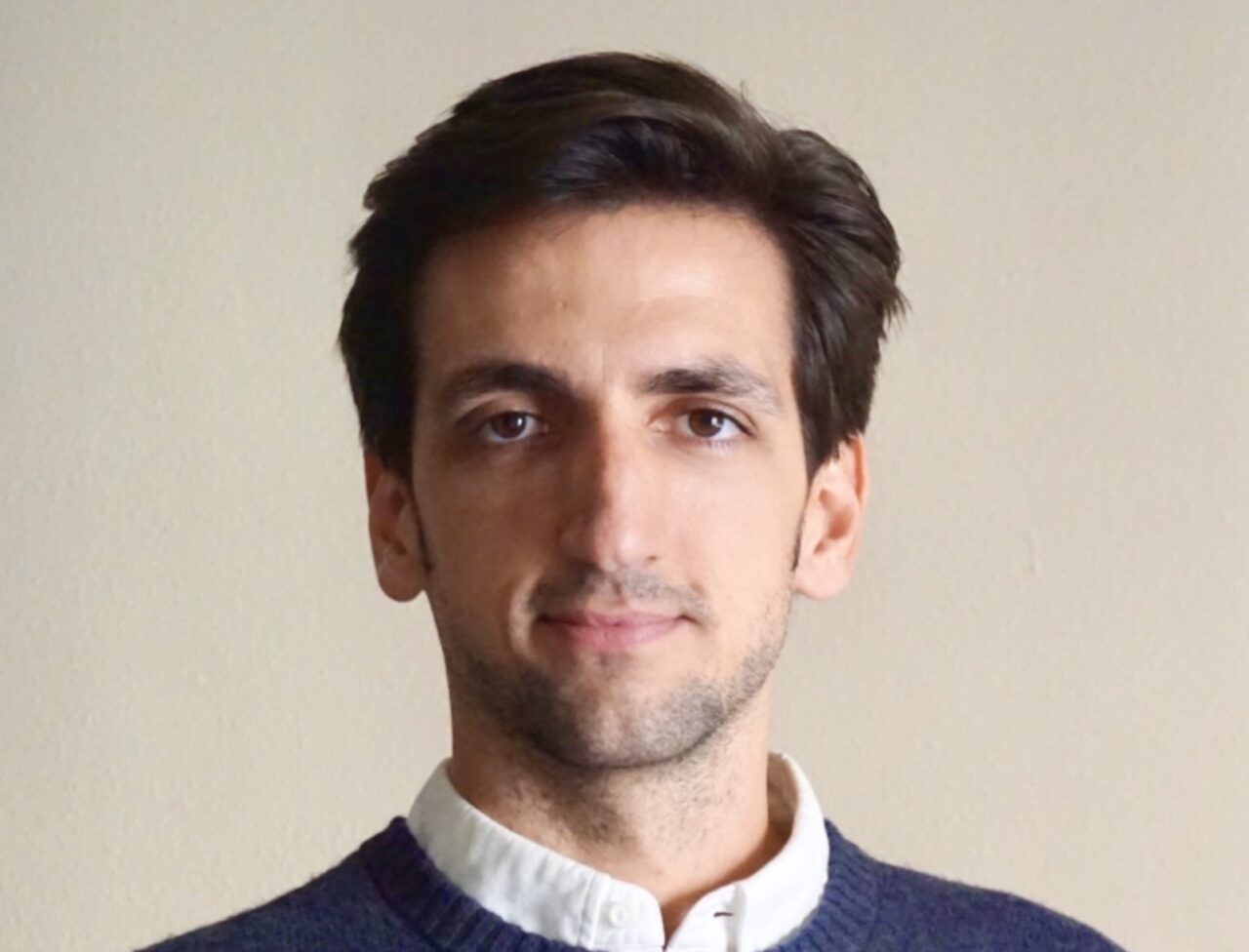
This week’s edition of Finovate Global features an in-depth interview with Nacho DĂaz de Argandoña, Chief Product Officer with Spain-based fintech, GPTAdvisor.

Founded in 2023 and headquartered in Madrid, GPTadvisor made its Finovate debut earlier this year at FinovateEurope 2024 in London. GPTadvisor offers a Gen AI platform that is specifically built to boost the productivity of financial advisors and wealth managers, as well as enhance client engagement.
This year, GPTadvisor announced that it has successfully completed a capital expansion round that featured support from two major Spanish venture capital firms, Kfund and JME Ventures. The company also announced that has launched a version of its GPTadvisor solution in the GPT Store by OpenAI. This launch made GPTadvisor the first portfolio management app available in the OpenAi store.
We caught up with Nacho to talk about current trends in wealth management and what AI can bring to the industry.
What problem does GPTadvisor solve and who does it solve it for?
Nacho DĂaz de Argandoña: GPTadvisor addresses a critical challenge in the wealth management sector: the need for increased efficiency and productivity to remain competitive in an increasingly complex financial landscape. Financial advisors often face time-consuming, repetitive tasks such as investment research, portfolio management, and compliance. These tasks can detract from their prime objective, which is increasingly harder to accomplish: to nurture strong relationships with their clients and provide them with truly personalized and strategic advice.
GPTadvisor solves this context by providing advanced AI-driven tools that automate and streamline many of these processes, in a secure, private and controlled environment. Our wealth management platform uses the latest generative AI technology to assist financial advisors in quickly finding the right investment product, analyzing and comparing portfolios, elaborating comprehensible narratives to excel in client engagements and, ultimately, helping their clients reach their financial goals. By dramatically improving productivity, GPTadvisor allows advisors to focus more on client relationships and strategic decision-making.
The primary beneficiaries of our solutions are wealth management entities, including financial advisory firms and independent financial advisors. We see this product as a truly global proposition, where advisors anywhere around the globe can really start engaging in a new way of working.
How does GPTadvisor solve this problem better than other companies or solutions?
DĂaz de Argandoña: GPTadvisor emerged during the generative AI wave with a clear objective: to apply this groundbreaking technology specifically to the wealth management sector. This focus distinguishes us from many other tech companies that, while experienced in general AI, are now struggling to adapt to the fundamentally different approach required by generative AI. Our foundation in this new paradigm allows us to harness its full potential in ways that others find challenging.
Having said that, we take AI very cautiously. We acknowledge there is a lot of noise and over-reliance in the industry where we expect AI to solve all our problems, and that is not the case. We focus on the use cases that provide the biggest gains in productivity, but without putting compliance at risk. This is why we proactively collaborate with regulators – FCA in the UK and CNMV in Spain – to explore the risks this technology involves and frame the guidelines to follow in order to successfully implement these capabilities.
Our core team brings over 40 years of collective experience in the wealth management industry. This deep expertise has enabled us to develop an innovative product from the ground up, in close collaboration with key industry partners. We work closely with numerous wealth management entities worldwide to ensure that our solutions are aligned with industry needs, making them both relevant and impactful.

Who are GPTadvisor’s primary customers. How do you reach them?
DĂaz de Argandoña: GPTadvisor’s primary customers range from big commercial banks, private banks, and wealth management firms, to financial advisory entities and independent financial advisors. We work with entities that are seeking innovative solutions to enhance their productivity, streamline their processes, and ultimately provide more value to their clients by leveraging the latest technology in the market.
Interestingly, we’ve been receiving considerable inbound interest from various industry entities, driven in part by the growing enthusiasm for generative AI. As a result, we are actively engaging these entities and incorporating them into our aggressive generative AI product roadmap. This roadmap is designed not only to meet current market demands, but also to anticipate and continuously bring the benefits of this technology that is moving at unprecedented velocity.
We’ve also had the opportunity to pitch and present our work in numerous industry events, just like what we did with you last February at FinovateEurope in London. These platforms allow us to demonstrate the unique capabilities of our solutions to a wide audience that has generated very interesting conversations for us.
By capitalizing on the current momentum around generative AI and maintaining a strong and cold focus on the needs of wealth management professionals, I think we are successfully positioning GPTadvisor as the go-to solution for entities looking to stay ahead in this rapidly evolving landscape.
Can you tell us about a favorite implementation or deployment of your technology?
DĂaz de Argandoña: One of our most exciting recent implementations is our quick portfolio analysis tool. This innovative function allows advisors to simply take a picture of a client’s portfolio with their phone and receive an instant, comprehensive analysis, thoroughly explained. The analysis includes generated insights on performance, risk, fees, and even comparisons with model portfolios. All in one go. This feature exemplifies the kind of intuitive, productivity-boosting tools we aim to deliver, making sophisticated portfolio analysis as simple as taking a photo.
Another feature we’re particularly proud of is our fund documentation auto-read feature. This tool is going to be a game-changer for GPTadvisor users globally, as they are now going to be able to instantly find and chat about key data and information in the documentation of thousands of investment funds. Whether they need details on fund performance, fees, or any other critical information, this tool streamlines the process, saving valuable time and enhancing decision-making capabilities.
These features are just the tip of the iceberg. We’re seeing new productivity functions like these arise on a weekly basis, as our team is able to move in sync with the fast-paced advancements in generative AI. Our ability to rapidly bring ready-to-use features to the wealth management space is one of the key strengths that sets GPTadvisor apart. It’s incredibly rewarding to see these innovations in action, transforming how wealth managers spend their valuable time and providing them with the tools they need to stay competitive.
What in your background gave you the confidence to tackle this challenge?
DĂaz de Argandoña: The confidence to tackle challenges at GPTadvisor stems from the extensive experience and proven track record of our CEO, Salvador Mas. Before founding GPTadvisor, Salvador served as the Chief Digital Officer at Allfunds for five years, where he played a pivotal role in the company’s digital transformation and its successful public offering. Prior to his tenure at Allfunds, Salvador founded several startups at the forefront of innovation in wealth management. His most recent venture, Finametrix, a portfolio management platform, was eventually acquired by Allfunds.
This entrepreneurial experience, coupled with his leadership in a global financial powerhouse, has provided Salvador with deep insights into the challenges and opportunities within wealth management. It has also equipped him with the expertise to leverage technology in creating innovative solutions that address real-world problems in the sector.
Under Salvador’s leadership, we have fostered a highly talented, agile, and focused team at GPTadvisor, which has successfully grown the product and its capabilities since its inception just over a year ago.
With this strong foundation, we are confident that we are well-positioned to lead the way in bringing cutting-edge generative AI solutions to the industry.
What is the fintech ecosystem in Spain like? What is the relationship between fintechs, banks, and traditional financial services companies in the country?
DĂaz de Argandoña: The relationship between fintechs and traditional financial services companies in Spain is characterized by a mix of competition, collaboration, and co-opetition.
In the specific case of wealthtech, traditional institutions have maintained their market share despite some success stories (such as the robo-advisor Indexa Capital and the neobank MyInvestor). However, the majority of advisory services continue to be provided by traditional institutions like Santander, BBVA, or CaixaBank, which have successfully embraced digital transformation.
At GPTadvisor, we are collaborating with both types of entities, introducing generative AI in both traditional and disruptive institutions.

You demoed at FinovateEurope earlier this year. How was your experience?
DĂaz de Argandoña: FinovateEurope was an excellent experience for us. The event was professionally and thoughtfully organized, making us, as demo participants, feel like true protagonists. It provided a valuable platform to connect with a wide range of wealth management professionals, investors, and industry stakeholders, which allowed us to test our proposition with real prospects in London—one of the world’s premier fintech hubs.
As we prepare to demo our solution again, this time in New York, it feels like a natural next step in our journey. Entering the U.S. market is a key priority for us, as we believe our solution can significantly enhance the day-to-day operations of financial advisors across the country.
We’ve been steadily growing our platform, adding a host of new features and enhancements, and we can’t wait to showcase these developments on stage. We’re confident that the New York demo will be another great experience for us, helping us to further expand our presence in a critical market.
What are your goals for GPTadvisor? What can we expect to hear from you in the months to come?
DĂaz de Argandoña: Over the past year, we’ve focused intensely on refining and validating our proposition in the market. We’ve been building a next-generation AI-native platform from the ground up, one that evolves in tandem with the rapid advancements in AI technology. Our approach has involved close collaboration with leading financial entities worldwide, ensuring that we stay connected to the real-world challenges and opportunities that need solving.
I believe we’re now at a tipping point where the product is ready for greater scale. GPTadvisor is now ready to support thousands of financial advisors work more productively and deliver more value to their clients. Our plan is launching our SaaS model at global scale through the second half of the year to reach more clients and gain more leadership in the market.
As we continue to explore the full potential of generative AI and its applications within our sector, I can’t imagine a more exciting time to be involved in shaping the future with GPTadvisor. We’re just getting started, and there’s much more to come.
We hope you enjoyed our conversation with Nacho. In case you haven’t noticed, we’re making a big deal out of wealthtech next month at FinovateFall. Check out our coverage of keynote speakers and power panelists focusing on top issues in wealthtech and wealth management, our preview of wealthtech-focused demoing companies, and more!
Here is our look at fintech headlines around the world.
Asia-Pacific
- The Commonwealth Bank of Australia teamed up with the Bank of New York Mellon to accelerate cross-border payments for Australians.
- Five business groups have indicated interest in applying for virtual bank licenses from the Bank of Thailand.
- Singapore-based neobank Fingular announced topping the four million customer milestone.
Sub-Saharan Africa
- Kenyan payroll provider Workpay secured $5 million in funding in a round that featured Visa as an investor.
- Nigeria’s Afrigopay launched instant POS settlement for AfriGO card transactions.
- Pan-African cryptocurrency exchange Yellow Card announced a strategic partnership with blockchain platform Fireblocks.
Central and Eastern Europe
- Germany’s Upvest announced a partnership with Deutsche Bank.
- Romania-based AI and blockchain technology company Humans.ai acquired Starfish Technologies, creator of TensorChain.
- Kosovo’s central bank called a new co-operation agreement with the International Finance Corporation (IFC) a “significant step forward” in the path toward greater digitization in financial services.
Middle East and Northern Africa
- The National Bank of Ras Al Khaimah partnered with Bitpanda Technology Solutions to offer a digital asset management platform for UAE investors.
- Revolut granted access to Israeli payment rails by the Bank of Israel.
- Egyptian fintech Lucky secured $3 million convertible note.
Central and Southern Asia
- Pakistan-based fintech PostEx raised $7.3 million in pre-Series A funding to support its expansion in the GCC.
- Banking Circle teamed up with Indian cross-border payments firm Skydo to enhance cross-border collections for Indian businesses.
- Indian transaction banking platform TransBnk raised $4 million in Series A funding.
Latin America and the Caribbean
- Mercado Libre’s fintech division, Mercado Pago, introduced a USD-based stablecoin in Brazil.
- Uruguayan cross-border payments platform dLocal forged a strategic partnership with Uphold.
- BucksApp, a B2B fintech startup headquartered in Paraguay and Bolivia, raised $1 million in funding.

